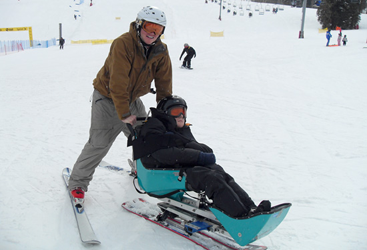In November 2008 Community Enterprise – an organisation that carries out market research for social enterprises and community groups – were commissioned by WWT to research the feasibility and viability of the Camper-Truck project. Check the plans for our dream truck in the Gallery.
Feedback on the research was presented to the directors in spring 2009.
Executive Summary
Aim of the Study
Wicked World Tours have a vision of a world where people with disabilities can freely participate in activities of their choice. Travel can be challenging for many disabled people but particularly so for wheelchair users and those with profound disabilities.  This study aims to test the feasibility of a new kind of vehicle that will enable people with relatively high support needs to travel more than just for short breaks to accessible hotels in tourist resorts. It seeks to recommend a solution to this problem by investigating need and demand and by identifying viable and sustainable options for meeting that need.
Background and Methodology
The results of this study are based on a combination of qualitative and quantitative research methods including a range of stakeholder interviews, a demographic study and analysis of relevant policies and strategies. Case studies of similar initiatives were then considered alongside focus groups and an online survey. This was followed by an investigation into technical data, a funding analysis, a full cost appraisal and a viability check.
Key Findings
A full list of 55 options is set out in section 8. The following is a summary of the crucial ones followed by three options, the pros and cons of which are discussed in full in section 8.
- There was a demand for international adventurous travel, though significant levels of nervousness around the detail of how this could be achieved.
- There are clear and well evidenced barriers to disabled travel especially for those with profound disabilities.
- The service proposed by WWT is unique.
- The target market for this vehicle is very small both in Scotland and UK
- It was difficult to get access to universities to promote the idea.
- Funding of such trips is a key problem, both institutionally and individually.
- Problems with arranging care packages for longer international trips is a fundamental barrier.
- There are a variety of technical restrictions and compliance issues.
- A vehicle of such a size, and external design, is likely to stand out and might cause issues of stigma as opposed to promoting inclusion.
- There is demand for short breaks and holidays with family and friends as well as adventure trips.
- There is a demand for opportunities for gap years and exchange programmes for people with disabilities, but the limiters on this idea are administrative and financial rather than based on transport and accommodation.
- WWT as an organisation have the passion and drive to make something happen and run it in a focussed way but do not have the capacity to operate any major and complex service within the resources they have.
- Grant funding is likely to be available for the initial investment of this initiative.
- Cost of hiring the vehicle would be very high for customers if it was not subsidised. The hire charge would need to cover operating costs and the customer would in addition have to fund diesel and any other costs of their trip.
At first, as a result of the study WWT decided to apply for a grant to employ a worker to run a bespoke travel service for disabled people. Throughout 2010 and 2011 and up to the present time November 2012, we have been unsuccessful in raising the money required to do this. In 2012 we decided to to assist adventurous disabled travellers by setting up a small grants programme. Â
